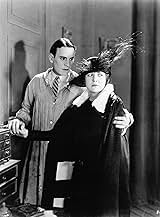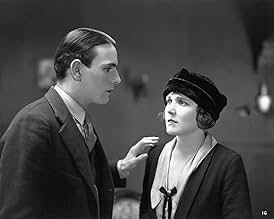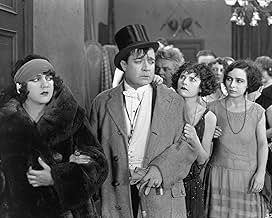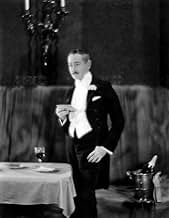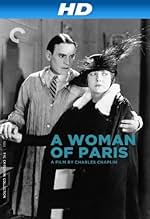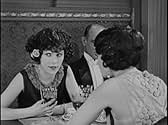AVALIAÇÃO DA IMDb
6,9/10
6,7 mil
SUA AVALIAÇÃO
Uma mulher sustentada pelo marido encontra seu ex-noivo e se vê dividida entre o amor e o conforto.Uma mulher sustentada pelo marido encontra seu ex-noivo e se vê dividida entre o amor e o conforto.Uma mulher sustentada pelo marido encontra seu ex-noivo e se vê dividida entre o amor e o conforto.
- Prêmios
- 3 vitórias no total
Charles K. French
- Jean's Father
- (as Charles French)
Nellie Bly Baker
- Masseuse
- (não creditado)
Henry Bergman
- Head Waiter
- (não creditado)
Charles Chaplin
- Station Porter
- (não creditado)
Frank Coghlan Jr.
- Boy
- (não creditado)
Antonio Corsi
- Accordion Player
- (não creditado)
Harry d'Abbadie d'Arrast
- Man in Nightclub
- (não creditado)
Stella De Lanti
- Revel's Fiancée
- (não confirmado)
- (não creditado)
Jean de Limur
- Man in Nightclub
- (não creditado)
Charles Farrell
- Man in Nightclub
- (não creditado)
Bess Flowers
- Mannequin
- (não creditado)
Avaliações em destaque
'A Woman of Paris' is rather a curiosity in Charles Chaplin's filmography. It stands as the only pure drama he wrote and directed. The film he made just to help foster Edna Purviance's career independent from him. This film was Edna's first and practically the last leading role ('A Woman of the Sea' from 1926 was never released and is now considered to be lost), which, of course, is a pity, because besides being gorgeous, she was a fine actress, and was able to shine on her own not only as of the sidekick of The Tramp. The complex role Marie St. Clair proved that. The film itself was a failure at cinemas not because it was bad (critics at that time liked it), but because Chaplin wasn't in it (only for a brief cameo - a man carrying the box in the trainstation). And it was, oh the horror! a drama.
I guess that's the reason, why Chaplin never tried his hand at a serious movie ever again (although he experimented with quite risky stuff later in his career). That's another pity - because Chaplin truly knew how to create complex characters amid moral turmoils and dilemmas. 'A Woman of Paris' is undoubtedly with flaws. Well, it was practically Chaplin's second feature film and the first time where he ventured that far from his comfort zone.
Altogether, 'A Woman in Paris' is a good drama (probably a bit overly melodramatic by the end), and needs more recognition from Chaplin fans and all silent cinema admirers alike. It really shows that Chaplin was much more diverse and deep as a filmmaker than just offering magnificent laughs.
I guess that's the reason, why Chaplin never tried his hand at a serious movie ever again (although he experimented with quite risky stuff later in his career). That's another pity - because Chaplin truly knew how to create complex characters amid moral turmoils and dilemmas. 'A Woman of Paris' is undoubtedly with flaws. Well, it was practically Chaplin's second feature film and the first time where he ventured that far from his comfort zone.
Altogether, 'A Woman in Paris' is a good drama (probably a bit overly melodramatic by the end), and needs more recognition from Chaplin fans and all silent cinema admirers alike. It really shows that Chaplin was much more diverse and deep as a filmmaker than just offering magnificent laughs.
Finally saw Woman of Paris: this was a legendary film in its day, but mostly because it was virtually never re-released for sixty years after it premiered in 1923, so the legend grew in its absence. The parts of the story that were not told would have made a better movie than the movie, for example why the lovers' fathers at the beginning of the film are against the marriage, and how Marie (Edna Purviance) became a (shudder) "Woman of Paris" during the year following her departure from her fiance. So I didn't buy the story but the camera work and editing do marvelous things with the story that is there. The melodramatic climax is a bit much to be believed, but not comical as a lot of silent mellers appear today. A little D.W. Griffith (sophisticated early use of photography to tell story and set mood), a little Tolstoy ("bad woman" story contrasted with storyteller's emphasis on happy marriages and wholesome family life), a touch of Dreiser ("sinful" characters shown with realistic insight) and I'd guess a soupcon of Terrence Ratigan (sophisticated attitudes) but I doubt he was around then. The ad copy for this film says Chaplin has a cameo as a railway porter but I didn't notice one in the train scene: I suspect instead he was the ticket agent whose hand appears pointing out the ticket window toward the train. Altogether a satisfying and entertaining film, but the story would have been better if Chaplin had worked on it a little longer.
I was looking in Charlie Chaplin's memoirs and I found that his original idea for the plot of A Woman Of Paris came from pillow talk with Peggy Hopkins Joyce involving one of her former boyfriends, a French publisher. From this came Charlie's idea to direct, but not appear in a film and hopefully make his long time leading lady from slapstick comedy, Edna Purviance a major dramatic star.
The reason given for the non-success of A Woman of Paris is usually given as the fact that people bought tickets and were disappointed that they did not see a Charlie Chaplin comedy. Probably on the silent screen, star images were even more fixed in people's minds than they were when sound came in.
But seeing it today it really does go overboard into melodrama. Edna's a simple country girl who loves Carl Miller, a struggling artist. Some blind mischances of fate and she winds up the paid woman of Parisian rake Adolphe Menjou. It's the tragedy of one romantic and the salvation of sorts for the other that are the basis of the story.
You couldn't make a film like it today, audiences would just laugh at it. In 1923 audiences were looking for laughs attached to the Chaplin name and found none. Edna does a fine job, but the public would not accept her in a drama. Adolphe Menjou as the rake comes off best in the cast.
The film ironically enough was Chaplin's first for the newly formed United Artists of which he was a quarter interest partner. After this one failed at the box office, he went back to cranking out the comedies we expected from him.
Back when I was working person at New York State Crime Victims Board, I had a claimant named Wayne Purviance who was the victim of an anti-gay bias attack in 1982. It was a crime that galvanized the GLBT people of New York City, this person in particular. Wayne was the grand nephew of Edna Purviance.
He's no longer among the living, but to you Wayne Purviance who took some real blows for millions of people, this review is lovingly dedicated to you and your wonderful aunt.
The reason given for the non-success of A Woman of Paris is usually given as the fact that people bought tickets and were disappointed that they did not see a Charlie Chaplin comedy. Probably on the silent screen, star images were even more fixed in people's minds than they were when sound came in.
But seeing it today it really does go overboard into melodrama. Edna's a simple country girl who loves Carl Miller, a struggling artist. Some blind mischances of fate and she winds up the paid woman of Parisian rake Adolphe Menjou. It's the tragedy of one romantic and the salvation of sorts for the other that are the basis of the story.
You couldn't make a film like it today, audiences would just laugh at it. In 1923 audiences were looking for laughs attached to the Chaplin name and found none. Edna does a fine job, but the public would not accept her in a drama. Adolphe Menjou as the rake comes off best in the cast.
The film ironically enough was Chaplin's first for the newly formed United Artists of which he was a quarter interest partner. After this one failed at the box office, he went back to cranking out the comedies we expected from him.
Back when I was working person at New York State Crime Victims Board, I had a claimant named Wayne Purviance who was the victim of an anti-gay bias attack in 1982. It was a crime that galvanized the GLBT people of New York City, this person in particular. Wayne was the grand nephew of Edna Purviance.
He's no longer among the living, but to you Wayne Purviance who took some real blows for millions of people, this review is lovingly dedicated to you and your wonderful aunt.
A melodrama rather than the saucy Parisian comedy the title and the name of Charles Chaplin suggests. Promptly withdrawn by its creator, 'A Woman of Paris' was for over half a century one of those films whose reputation was based upon it's unavailability for reappraisal and like many of Chaplin's later films was to prove a disappointment when it was finally revived in the 1970s.
Both the plot and the wardrobe worn by Chaplin's leading lady Edna Purviance evokes the era of Chaplin's fellow United Artist D. W. Griffith rather than the continental sophistication suggested by the title, while the presence of Adolphe Menjou happily anticipates the nascent sophistication of the twenties.
Both the plot and the wardrobe worn by Chaplin's leading lady Edna Purviance evokes the era of Chaplin's fellow United Artist D. W. Griffith rather than the continental sophistication suggested by the title, while the presence of Adolphe Menjou happily anticipates the nascent sophistication of the twenties.
Charles Chaplin is noted for his comedy performances, and deservedly.
His direction, though, should be more highly regarded, if only for this one motion picture.
Compare the quality of the photography and the smoothness of the editing to, for example, "The Gold Rush," of about the same time.
"A Woman of Paris" is very modern; "The Gold Rush" is downright primitive (but, in spots, brilliant).
"A Woman of Paris" also shows some admirable acting talent in, really, all the players. Some of the lesser characters are still played beautifully, despite being "lesser," especially Marie's maids and her, more or less, friends, and very especially the masseuse.
And the scene where the artist's mother, played by Lydia Knott, bent on revenge, comes upon Marie -- with no words, just body movement and facial expression -- she tells the audience what the proverbial thousand words could not so well.
Credit for part of that good acting must, of course, go to the director, but even the best director can't make much of poor actors.
Chaplin had very good actors. Adolphe Menjou reached stardom, and deservedly. What a tremendous talent; he could do everything.
Edna Purviance should have achieved much more acclaim. She performed admirably, especially in this movie, and she was attractive. Fame is certainly fickle.
In some ways, "A Woman of Paris" might be written off by a few as "soap opera." But it is well worth watching for the performances and, especially, for the directing.
His direction, though, should be more highly regarded, if only for this one motion picture.
Compare the quality of the photography and the smoothness of the editing to, for example, "The Gold Rush," of about the same time.
"A Woman of Paris" is very modern; "The Gold Rush" is downright primitive (but, in spots, brilliant).
"A Woman of Paris" also shows some admirable acting talent in, really, all the players. Some of the lesser characters are still played beautifully, despite being "lesser," especially Marie's maids and her, more or less, friends, and very especially the masseuse.
And the scene where the artist's mother, played by Lydia Knott, bent on revenge, comes upon Marie -- with no words, just body movement and facial expression -- she tells the audience what the proverbial thousand words could not so well.
Credit for part of that good acting must, of course, go to the director, but even the best director can't make much of poor actors.
Chaplin had very good actors. Adolphe Menjou reached stardom, and deservedly. What a tremendous talent; he could do everything.
Edna Purviance should have achieved much more acclaim. She performed admirably, especially in this movie, and she was attractive. Fame is certainly fickle.
In some ways, "A Woman of Paris" might be written off by a few as "soap opera." But it is well worth watching for the performances and, especially, for the directing.
Você sabia?
- CuriosidadesThe reissue of this film, with a musical score and new cut by Sir Charles Chaplin, was the last work of his entire film career. By then, the 87-year-old Chaplin was visibly frail but still walking. His score was aided by arranger Eric James, and he took a small theme from Monsieur Verdoux (1947), but most of the score was Chaplin's. The film was reissued posthumously in 1977 with the new score to overwhelming critical and public praise. At that time, many critics praised it (as in the trailer) as one of the best films ever made.
- Erros de gravaçãoWhen Jean starts fighting with Pierre in the restaurant, Pierre's glass of wine or champagne gets knocked over. When Pierre sits down on the table afterwards, the glass stands on the table filled with drink as if it hadn't been knocked over.
- Citações
[Intertitle]: Time heals, and experience teaches that the secret of happiness is in service to others.
- Versões alternativasDuring 1976, Chaplin was preparing a reissue of A Woman of Paris/Sunnyside but died before completion. The project was completed after his death, and the films were reissued in the United States by Kino International Corp. in 1978. This version, however, dispensed with an opening subtitle, as well as a few brief insert shots.
- ConexõesFeatured in Chaplin Today: Modern Times (2003)
Principais escolhas
Faça login para avaliar e ver a lista de recomendações personalizadas
- How long is A Woman of Paris: A Drama of Fate?Fornecido pela Alexa
Detalhes
- Data de lançamento
- País de origem
- Central de atendimento oficial
- Idioma
- Também conhecido como
- Una mujer de París
- Locações de filme
- Empresa de produção
- Consulte mais créditos da empresa na IMDbPro
Bilheteria
- Orçamento
- US$ 351.000 (estimativa)
- Faturamento bruto mundial
- US$ 12.921
- Tempo de duração
- 1 h 22 min(82 min)
- Mixagem de som
- Proporção
- 1.33 : 1
Contribua para esta página
Sugerir uma alteração ou adicionar conteúdo ausente

